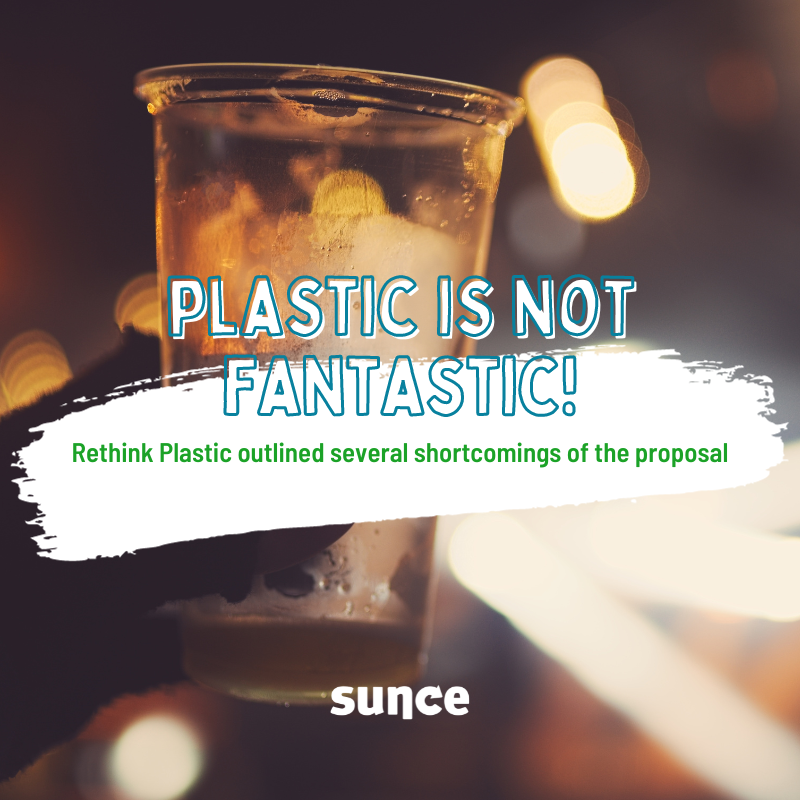
Rethink Plastic makes key recommendations for advancing proposals for packaging and packaging waste.
The European Union is increasingly focusing on tackling packaging waste and promoting sustainability in the packaging sector. In this regard, the European Commission has proposed a Packaging and Packaging Waste Directive, which aims to prevent waste generation and encourage re-use. However, the European Alliance of NGOs, Rethink Plastic, outlined several shortcomings of the proposal.
In June, Sunce supported an open letter sent to the European Parliament and ministers of the Council of the European Union by the Rethink Plastic Alliance (ZWE, EEB, Client Earth and ECOS), Deutsche Umwelthilfe e.V. (DUH), Recycling Netwerk Benelux and non-governmental forestry organizations (FERN + EPN). This initiative aimed to encourage decision-makers to support ambitious packaging reuse targets.
Below we present the main recommendations of the Rethink Plastic Alliance.
There’s no time to waste!
It is important to complete the legal process of adopting the Directive in this mandate of the European Commission to stop the growth of packaging waste. The proposal for a Directive provides an opportunity for important changes towards a circular packaging system. Producers and politicians must prioritize consumer and environmental protection and ensure the timely adoption of the Directive.
It is necessary to provide a legal basis for the prevention of waste.
The current proposal for the Directive has limitations that prevent Member States from taking measures to reduce packaging. A legal basis should be provided so that Member States can take waste prevention measures. Waste prevention targets need to be more ambitious, and specific targets need to be set for different materials to avoid replacing single-use products with other single-use materials.

Re-use in focus!
It is necessary to define more clearly a system for re-use that would include incentives for the return of packaging. The rate of return of reusable packaging should be above 90% and the re-use targets should be extended to other sectors and product groups. Calculation methods and metrics for tracking reuse and filling should be more precisely defined.
Consumers and the environment should be protected from hazardous chemicals in packaging.
The current proposal does not sufficiently encourage the removal of harmful chemicals in packaging. To protect consumers and the environment, a more sustainable approach to these chemicals is needed. All substances recognized as of concern should be restricted. Furthermore, Rethink Plastic points to a delay in the revision of the food contact materials regulation and the lack of harmonized rules for paper and cardboard as the largest group of packaging materials. More ambitious measures are needed to protect consumers, especially vulnerable groups. This includes stricter requirements for chemicals and mechanisms to phase out the most harmful substances.
Collection targets should only be set for recyclable packaging.
Setting collection targets for non-recyclable packaging puts an additional strain on municipal authorities and recycling processes. It should primarily be defined which waste can be recycled with high quality based on the latest collection, sorting, and recycling processes. Collection targets should only be set for recyclable packaging. Also, deposit return schemes can be most effective for achieving high collection rates, especially for certain packaging formats. At the same time, there are derogations and exemptions in the Packaging and Packaging Waste Directive that create holes in the system, and the proposal for a Regulation misses the definition of important aspects such as recyclability. Furthermore, the provisions on penalties are unclear.

Standards must be revised to comply with the proposed regulation.
The European Commission proposes that packaging manufacturers can use existing European standards to ensure compliance with sustainability requirements. However, certain standards must be revised or new ones adopted to comply with the proposed regulation. Also, economic operators using reusable packaging can assume compliance with the European standard. These standards also need to be revised to comply with the new requirements.
The possibility of deviation from the deposit refund scheme should be eliminated.
Most successful waste management systems already enable the return of reusable and single-use packaging, which is also practical for consumers. The obligation to establish a return system for single-use plastic bottles and beverage cans will drastically reduce waste in the environment. However, there is an exemption in the Directive from the obligations to establish a recovery system. This exemption could lead to delays and a lack of transparency. It is therefore important to erase the possibility of derogating from the installation of the return system to achieve environmental protection and the adoption of re-use.
Extended producer responsibility should be applied.
Producers should bear the costs of cleaning up waste resulting from their packaging, including the costs of raising awareness of waste prevention and reduction. This shifts financial responsibility from public authorities and taxpayers to producers. This requirement should apply to those forms of packaging that are often thrown away and not collected separately, such as takeaway food packaging. A similar obligation already exists for certain types of single-use plastic packaging. Limited provisions on extended producer responsibility should be strengthened to promote circular products and business models and to ensure better access to information and producer responsibility. Also, it is necessary to create a “Fund for Change” that will support the transition to more recyclable packaging and greater use of recycled materials, as well as support for companies implementing re-use systems. This fund could also benefit municipalities and communities by investing in local systems to prevent and reuse packaging waste. The proposal for a Packaging and Packaging Waste Directive brings important steps towards tackling packaging waste and promoting sustainability in the packaging sector. However, to make real progress, Rethink Plastic’s recommendations and proposals need to be considered to ensure more ambitious regulation that will boost the circular economy, waste prevention, and reuse of packaging